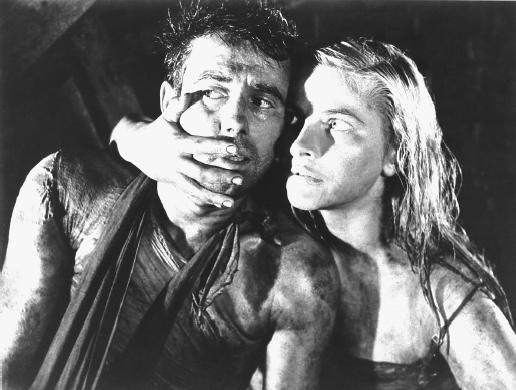 Throughout May, the BFI Southbank is showing a retrospective of the great Polish director, who was recently nominated for an Academy Award for his latest film, 'Katyn', which is opening shortly. I'm hoping to attend as many screenings as I can, but in the meantime I'll look at 'Kanal', which was the film that made Wajda's reputation in the West and forms the second part of the 'war' trilogy, preceded by 'A Generation' and followed by 'Ashes and Diamonds'.
Throughout May, the BFI Southbank is showing a retrospective of the great Polish director, who was recently nominated for an Academy Award for his latest film, 'Katyn', which is opening shortly. I'm hoping to attend as many screenings as I can, but in the meantime I'll look at 'Kanal', which was the film that made Wajda's reputation in the West and forms the second part of the 'war' trilogy, preceded by 'A Generation' and followed by 'Ashes and Diamonds'.'Kanal' opens with shots of the devastation of Poland during World War Two; a country in ruins during the German occupation and the human and economic cost of war is apparant. Wajda focuses on events in Warsaw specifically and the ill-fated 1944 uprising by remaining partisans against their oppressors. One company of soldiers have held out against the Germans but are trapped and cut off from their comrades, and their capture is surely a matter of course. These men are brave; as one says it's the Polish way to fight to the death, but also desperate. The uprising is on the verge of collapse and survival is only possible through one means - escaping through the sewer systems.
What follows is one of the most claustrophobic and clammy cinematic experiences, as the company trudge through the dark sewers with only the odd flashes of torchlight providing any respite. They must remain silent to evade capture and deal with the filthy and grimy conditions. Below ground it's hard to stay disciplined; some members of the company are left behind, one ducks out of the sewers at the wrong moment and is shot by German soldiers. Filled with fear and dread, these men and women are not portrayed as heroic or valiant - they are just patriots defending their freedom but nothing more than this. Their Hell is summed up by one soldier who quotes Dante (referring to 'Inferno') - "there in the depths of the pit as we stand....".
Wajda informs us immediately that this journey will not succeed and that there will be no contrived denouement. The fatalistic commentary reminds us that these are the last hours of these men and women's lives. The journey through the sewers might be a journey through Hell but there is no safety at the other end. Once Jacek and his girlfriend reach the end, they are captured by Germans and nearly the entire company are shown to be rounded up and imprisoned. Remaining soldiers are forced out by the Germans with explosives.
'Kanal' reminds me of 'The Wages of Fear' in its presentation of men under pressure in a claustrophobic environment. Nothing can prepare you for watching the agonising journey through the dark and dirty sewers with the bare glimmer of hope at the other end. We are shown the company as ordinary men and women, living their normal lives the day before the journey through the sewers - Jacek makes love to his girlfriend, they all sing collectively in a bar and so on. It's a modest film but laid the foundations for a career that continues and will be justly celebrated this month. 3.5/5
1 comment:
A poinient and moving film. In fact Stokrotka (Daisy), are not captured by the Nazis, but reach a barred outlet. It is a moving scene, but at another level, as we see the building on the other side of the Vistula, Wajda is saying: you didn't bring us the supplies we asked for, and you have left us here in the shit. The film is full of such covert messages.
My favourite character is Halinka. She follows her lover blindly in a dreamlike state, only to discover a photo of his wife and children, with tragic results. Instead of shooting herself, she should have shot him and continued thru the sewers to safety and got on with the rest of her life.
Altogether an inspiring film
Post a Comment